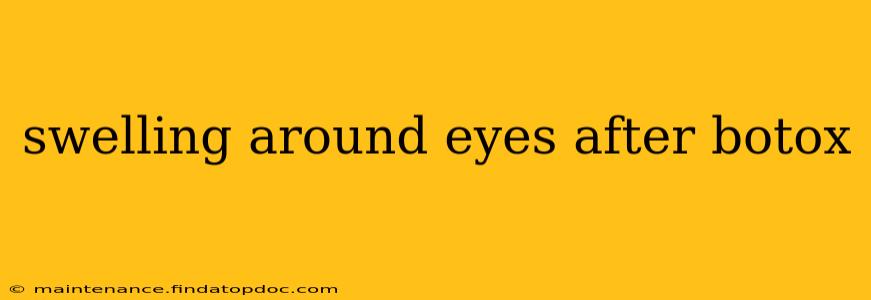Botox, a popular cosmetic treatment, is known for its ability to temporarily smooth wrinkles and fine lines. However, some individuals experience swelling around the eyes after Botox injections. While generally temporary and mild, understanding the causes, treatment options, and preventative measures is crucial for managing expectations and ensuring a positive experience. This comprehensive guide will address common concerns surrounding this side effect.
What Causes Eye Swelling After Botox?
Eye swelling after a Botox treatment is a relatively common side effect, albeit usually mild and resolving within a few days. Several factors contribute to this:
- Injection Technique: The proximity of the injection site to the delicate tissues surrounding the eyes makes them susceptible to swelling. A less precise injection technique can lead to greater inflammation.
- Individual Reactions: Just like any medical procedure, individual reactions vary. Some people are simply more prone to swelling and bruising than others. This is often linked to pre-existing conditions or medications.
- Product Diffusion: The Botox solution itself can sometimes diffuse beyond the intended injection site, irritating surrounding tissues and causing swelling. This is less common with experienced injectors.
- Underlying Conditions: Pre-existing conditions like allergies or a tendency towards inflammation can increase the likelihood of swelling.
- Post-Injection Activity: Engaging in strenuous activity or excessive heat exposure immediately after the procedure can exacerbate swelling.
How Long Does Eye Swelling from Botox Last?
The duration of eye swelling after Botox varies considerably depending on the factors listed above. For most individuals, swelling is minimal and subsides within 24 to 72 hours. However, in some cases, it can last for up to a week. If swelling persists beyond a week, it's crucial to consult your injector.
Is Swelling Around Eyes After Botox Normal?
While not the desired outcome, mild swelling around the eyes following a Botox injection is considered relatively normal. The key is to differentiate between normal post-injection swelling and something more significant that warrants medical attention. Minor swelling is typically accompanied by minimal discomfort and resolves quickly. However, significant or prolonged swelling should be evaluated by a medical professional.
How to Reduce Swelling After Botox Around Eyes?
Several strategies can help minimize and reduce swelling:
- Cold Compresses: Applying cold compresses to the affected area for 10-15 minutes at a time, several times a day, can help constrict blood vessels and reduce inflammation.
- Elevation: Keeping your head elevated can also reduce swelling by promoting better drainage.
- Avoid Strenuous Activity: Avoid intense exercise, bending over, or other activities that increase blood flow to the face immediately following the procedure.
- Avoid Alcohol and Caffeine: Alcohol and caffeine can both thin the blood, potentially increasing swelling and bruising.
- Arnica: Some individuals find that arnica gel or tablets can help reduce swelling and bruising, but it's important to discuss this with your doctor first.
What Should I Do if I Experience Severe Swelling?
Severe swelling, accompanied by significant pain, redness, or vision changes, requires immediate medical attention. These symptoms could indicate a more serious reaction and should be addressed promptly by a doctor or your Botox provider.
Can I Prevent Swelling After Botox?
While you can't entirely eliminate the possibility of swelling, you can take steps to minimize the risk:
- Choose an Experienced Injector: An experienced and skilled injector is much more likely to minimize the risk of complications like swelling. Look for board-certified professionals with extensive experience in Botox injections.
- Follow Post-Injection Instructions: Carefully follow all post-injection instructions provided by your injector. This includes recommendations regarding activity levels, medication, and aftercare.
- Communicate Concerns: Don't hesitate to discuss any concerns or pre-existing conditions with your injector before the procedure. Open communication is crucial for a successful outcome.
This information is for educational purposes only and does not constitute medical advice. Always consult with a qualified healthcare professional for any health concerns or before making any decisions related to your health or treatment.
